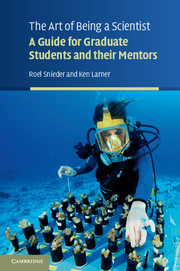Book contents
- Frontmatter
- Contents
- 1 Introduction
- 2 What is science?
- 3 Choices, choices, choices
- 4 The adviser and thesis committee
- 5 Questions drive research
- 6 Giving direction to our work
- 7 Turning challenges into opportunities
- 8 Ethics of research
- 9 Using the scientific literature
- 10 Communication
- 11 Publishing a paper
- 12 Time management
- 13 Writing proposals
- 14 The scientific career
- 15 Applying for a job
- 16 Concluding remarks
- Appendix A Further reading
- Appendix B A sample curriculum
- Appendix C The Refer and BibTeX format
- References
- About the authors
- Index
10 - Communication
Published online by Cambridge University Press: 05 June 2014
- Frontmatter
- Contents
- 1 Introduction
- 2 What is science?
- 3 Choices, choices, choices
- 4 The adviser and thesis committee
- 5 Questions drive research
- 6 Giving direction to our work
- 7 Turning challenges into opportunities
- 8 Ethics of research
- 9 Using the scientific literature
- 10 Communication
- 11 Publishing a paper
- 12 Time management
- 13 Writing proposals
- 14 The scientific career
- 15 Applying for a job
- 16 Concluding remarks
- Appendix A Further reading
- Appendix B A sample curriculum
- Appendix C The Refer and BibTeX format
- References
- About the authors
- Index
Summary
Our task is to communicate experience and ideas to others.
Niels BohrWHY COMMUNICATE?
The most basic answer to the question “why communicate?” is simply that scientists are human beings, and communication is one of the defining characteristics of being human. More specifically, here we elaborate on the value, both to individual scientists and to their profession, of communicating the findings of research.
Likely, a major factor that initially drew you into and has kept you in your chosen scientific career is the simple joy of intellectual discovery, of uncovering new ideas about how the physical world works. For many highly capable scientists, the internal satisfaction they experience in such discovery is reward enough. It is time-consuming and can be laborious, indeed burdensome, to detour from the scientific pursuit to share one's findings with others, through either publication in peer-review journals or presentation at conferences. Painful as it might be to devote energy to that detour, for several reasons expect communication of results to be of great value to you both personally and professionally. More broadly, publication is the breath of life for future progress in the sciences.
As emphasized in the next section, communication is difficult, and effective communication, whether in writing or delivered orally, is especially difficult. There must be some reward for taking such pains to share what you have been doing. Potential personal rewards are many.
- Type
- Chapter
- Information
- The Art of Being a ScientistA Guide for Graduate Students and their Mentors, pp. 146 - 175Publisher: Cambridge University PressPrint publication year: 2009

